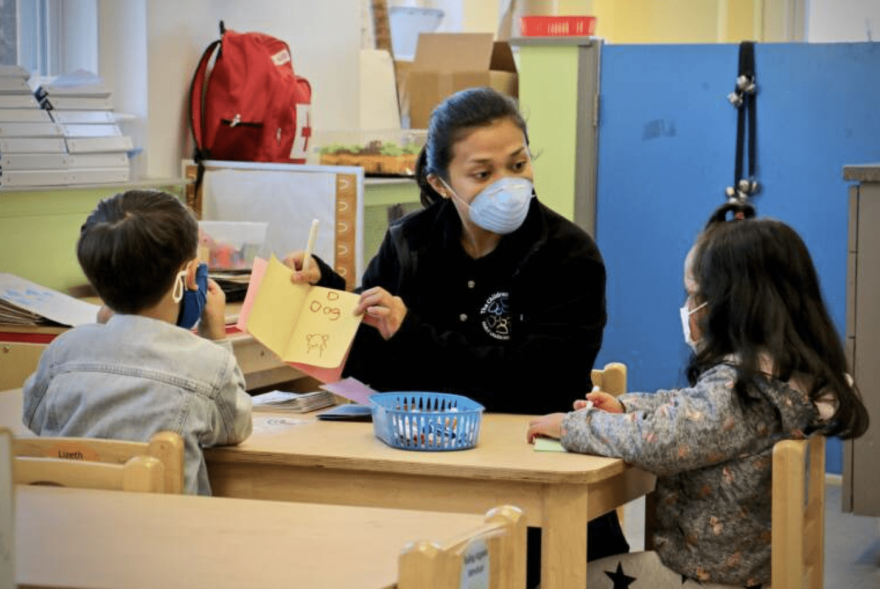- Pandemic funding for the child care sector expires on Sept. 30
- Congresswoman Wild is advocating for more federal funding
- Advocates say the sector needs more support
BETHLEHEM, Pa. — Affordable child care could become further out of reach for more Lehigh Valley families if federal funding for day care centers and preschools expires at the end of the month.
Nearly $24 billion in pandemic dollars earmarked for day care centers and preschools nationwide will end on Sept. 30 unless Congress extends it.
Congresswoman Susan Wild said she is pushing for $16 million in additional federal funding over the next five years to help shore up day care centers and preschools in the Lehigh Valley and nationwide through the Child Care Stabilization Act, introduced this week. Wild is a co-sponsor of the measure.
The American Rescue Plan, appropriated $24 billion nationwide, averting a funding crisis for the child care sector and families after COVID-19 hit. Passed in 2021, it provided $728.9 million to Pennsylvania for its child care system. A White House fact sheet shows that 4,205 child care centers in the state received funding, while 2,645 family day care centers got financial assistance. On average, preschools received an award of $142,500 and day cares received $11,600. Nearly 300 providers in Lehigh County and about 138 in Northampton County benefitted.
Wild said that was an important stopgap measure, but there’s still a critical shortage of child care options in Lehigh and Carbon counties. She said the potential drop in funding would be a catastrophe for working parents.
“The people you're hurting are working families and children, day care providers, and the staff that works there,” she said. “We've already got a workforce crisis in this country. Every employer I talk to needs more employees. And so you're going to see more and more people leaving the workforce because they can't get child care.”
The Century Foundation, a progressive think tank, estimates that more than 150,000 children in Pennsylvania will lose access to child care if the pandemic funding is shut off on Sept. 30. The group also predicts a statewide loss of 2,848 child care programs and more than 11,300 jobs in the sector.
The Pennsylvania Department of Human Services said it has a plan for filling in gaps left by the federal funding. In a statement, DHS said the department’s Office of Child Development and Early Learning allocated all of the pandemic funding that expires this month last September. Human Services received $455.7 million in supplemental pandemic money in January 2022, which doesn’t expire until this time next year. The department said it planned to use the money to increase reimbursement rates to child care providers, reduce family co-payments, and support nontraditional child care.
"If you can have parents going to work, not scrambling to figure out where their kids are going to be, you're gonna have more people showing up at work, you're going to have less absenteeism, you're going to have happier workers.”Congresswoman Susan Wild
The statement also pointed out Gov. Josh Shapiro’s budget includes $90.4 million dedicated to funding child care programs for low-income families. The U.S. Census Bureau recently reported poverty, especially among children spiked in the past year, with the rate climbing from 7.8% in 2021 to 12.4% in 2022.
“The administration is continuing to work to ensure child care programs – including Child Care Works for low-income families – have the resources they need to support families across the Commonwealth,” DHS said in the emailed statement.
Dan O’Brien, education and policy stability policy manager with Children First, a nonprofit advocacy group, quoted from a March report from the Pennsylvania Early Learning Investment Commission and Ready Nation PA in testimony on a proposed child tax credit earlier this year to a state House committee. The report said infant child care cost represents 40% of the median annual income of a single parent in Pennsylvania. That is an average of $12,152 a year in a center.
“Child care is unaffordable for nearly all families, especially low-income families who do not have access to subsidized child care and for middle-class families who do not qualify for subsidized child care,” he told lawmakers in his testimony. “Let me repeat that: Child care is unaffordable."
Wild said she is not optimistic more federal funding will pass in the U.S. House at the moment, especially when some are already concerned about a possible government shutdown.
But she argues there should be a long-term fix for child care, such as other legislation she has introduced. She said her bill would cap the cost of child care as a certain percentage of income, increase staff wages and implement universal pre-kindergarten.
“We've got to stop this patchwork approach and come up with a systemic solution to child care issues in this country,” she said. “I think it's for the betterment of our society. I think it's for the betterment of our children. And I think it is for the betterment of our economy. If you can have parents going to work, not scrambling to figure out where their kids are going to be, you're gonna have more people showing up at work, you're going to have less absenteeism, you're going to have happier workers.”


